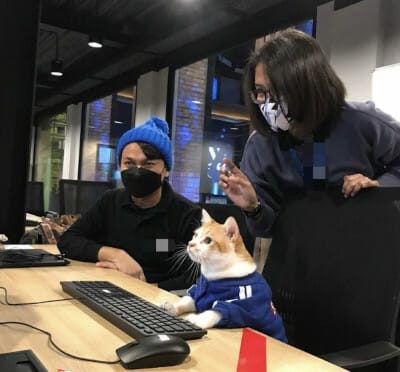How can you have a career as a developer, despite the continuous technological changes?
Let's look back to the past revolutions, the game-changing ones: how they have impacted our careers, both on a technological and human level.
How can we take the next wave, as a senior or junior developer?
This article is about mainstream developers. I can't speak for engineers and researchers who work in big IT companies and universities, and who can have long term visions for their jobs.
Once Upon a Time, the Developers
Here's a short overview of our recent developer history.
1950 - 1970: The Scientists
In the 50, the job was to write machine code, directly in binary, which required great logical and mathematical knowledge.
Most of these scientists were women, who handed over the data entry to punched card operators.
1970 - 1990: The Computer Programers
When high-level programming languages were created, skills level became lower and companies were able to hire technicians to create the programs. The projects consisted of basic forms and data manipulation. But it required a good knowledge of the mainframe acquired by the companies. With a good analysis of the company's needs, one could quite easily envisage a complete career as a programmer analyst.
1990 - 2010: Just a Developer
Then Dot-com bubble and the year 2000 problem boosted IT workforce needs. The name "developer" was created, with specialized master's degrees.
But at the same time, the number of juniors and the massive offshore outsourcing decreased the average skill level. The team was reinforced with non-technical profiles, like analysts, testers, and project managers. Developer became a junior position:
- 0 to 5 years: developer
- 5 to 10: analyst, tester
- 10+: project manager
2010 to 2015: The technical careers
During this period, agile methods flatten the hierarchy within the teams. Development was often relocated on-site. HR departments had to give more perspectives to developers and new roles like "tech lead", "technical expert" and "architects" were created. Somehow these new roles have shortened the developer career:
- 0 to 3 years: developer
- 3 to 8: tech lead or technical expert
- 8+: architect, technical manager
Since 2015
Since 2015, developers demand has continued to increase. Despite all the new IT schools and developer conversion, it doesn't cover the needs. So HR was forced to promote developers.
Moreover, the technologies are now even more complex so we can have today real careers as a developer:
- 0 to 3 years: junior developer
- 3 to 8 years: middle developer
- 8+: senior developer
The Technology Revolutions
Ecosystem Long Cycles
In this article, "ecosystem" stands for a set of techniques and tools around a specific language.
On this history fresco, we observe 10-years cycles for an ecosystem to emerge, lead, and be replaced:
Some examples:
- monolith softwares, available through a terminal, have been replaced by client-server softwares available on PC, between 1990 and 2000. C and le C++ have replaced COBOL and FORTRAN.
- then, these client-server softwares were replaced by web apps between 2000 and 2010, led by Java and PHP
- circa 2010, server-generated web apps have been replaced by Javascript frameworks and mobiles technologies
- from 2020, Python manages to be one of the most popular languages thanks to the development of Big Data and AI
These revolutions impact the development strategy. This implies, in the long-term, to learn these new paradigms.
The bright side is that it leaves us some time to anticipate it and take the opportunity of a new project to train ourselves.
But the effort to unlearn and relearn is challenging at a personal level. Most of the career switches from developer to something else occur during these periods. This is not very different from the changes in other professions.
Short Cycles of the Frameworks
Between each of these ecosystem revolutions, minor changes in trends can also occur. For example, framework taking the leadership within the same technology.
Their lifecycles being shorter, often 5 years, maintaining skills can be a serious challenge.
We can illustrate it with the history of web development.
Flash is the most advanced web technology from 2000 to 2005, especially to develop a rich UI.
But in parallel, Apple, Mozilla, and Google work on modernizing Javascript because they see Adobe's proprietary technology as a threat.
In 2010, Steve Jobs announced that Flash will not be supported on its devices. From then on, almost no new Flash project will be launched.
Web developers will have to relearn how to develop interfaces in Javascript. The continuous HTML5 and CSS3 innovations added lots of difficulties for developers to transition.
JQuery took the opportunity to steal Flash leadership. Web developers had become experts in working with $ functions. But in 2016, Angular, then React, and other SPA frameworks replaced it completely.
Web developers had to unlearn to modify directly HTML DOM, but make it react to state mutations. At that time, lots of developers throw in the towel.
For the other, the key was anticipation and technology watch.
Technology Watch
Technology watch allows developers to anticipate, so the perception must be early enough to be ready to seize opportunities when they come up.
The number of conferences on these subjects shows it.
Technology watch is also a source of concern: it is a time-consuming task, and not necessarily fruitful. The risk is to perceive a potential revolution too early, when it will never make it and will be abandoned.
In 2009, some developers see in Microsoft Silverlight the real replacement for Flash. However, Microsoft does not manage to impose its framework in the web environment, which is abandoned in 2012.
This has generated a lot of disappointment among its followers who may have been disgusted by such sudden changes of trend.
Our Personal Evolution
These passing fancies of the community, largely led by Silicon Valley startups, bring with them their share of worries.
I, the developer, who already have to be aware of everything and train on my own, can also bet on the wrong horse and find myself obsolete in a few years?
Yes, this phenomenon is reinforced by the continuous hiring of new graduates, who arrive on the market with an up-to-date technical background.
We fear that our experience will become obsolete along with our favorite frameworks, which we master so well.
This fear sometimes leads us to stay in our favorite domain, to remain efficient there, so that our expertise is not questioned by juniors.
The strategy can't be valid: technologies compete with each other; we cannot objectively choose the most suitable one if we advocate one of them without knowing the others.
Moreover, we're not alone in our company and new projects will migrate to these new technologies. Our colleagues are working on these new projects, one after the other. This can be painful. It can lead to the conclusion that your career as a dev is behind you and that you have to move away from technology. Why not, if one has the desire to redirect towards business expertise and management? Or consider a complete reconversion.
But what if that's not the case? What should I do if I don't have an appetite for other professions?
Starting From Scratch, Learning Everything Again
I'm going to talk a little bit about my case here.
I work today with 25 to 30 years old teammates, and at 40, my image is a "more then senior" dev! This additional experience does not give me a real advantage. I am not more efficient than the 30 years old me!
I am not less efficient either: I develop on the MERN stack like my young colleagues.
I would say that I know myself a little better than them: I know my abilities, my limits. I also know that I can and I will learn again.
I also know that we, developers, will always be able:
- build a data model
- analyze a process
- design a user interface
- deploy a solution and explain how to use it
I also know that you have to be attentive to new frameworks, and wait for them to become established before adopting them.
The next time it happens, I will have the same learning curve as a junior.
But after that, I will be able to :
- model business data
- analyze a process
- design a user interface
- deploy a solution and explain how to use it With as much experience as before.
The Future of Our Business
To conclude, let's talk about the future: winter is coming.
We hear the still hazy rumors: the activity of code production could be gradually delegated to AI platforms and highly advanced low-code tools. We are seeing very promising embryos such as Github Copilot, Power Apps, and of course ChatGPT.
In addition, developers are a resource that is far too expensive to imagine that companies will continue to invest staggering sums to pay for every piece of code needed to transform their information system.
Just like the wave of Cloud Computing changed the sysadmin profession, our own wave is inevitably coming.
We won't need developers anymore!
Of course, this is untrue.
It might be those very same developers who will be the future "prompt engineers" or "platform engineers" that will create tomorrow softwares.
Because, beyond the code, we will always know how to :
- model business data
- analyze a process
- design a user interface
- deploy a solution and explain how to use it
Those who wish to can stay in the game, by accepting a change in the way they work. The job market will inevitably be more competitive, but it will certainly not become the dead end that some predict.
Conclusion
This article contains a lot of subjectivity and shortcuts, of course.
Each personal situation is more complex than that; however, these ideas have been on my mind for a long time.
As I'm sure many of you have! Hoping to read your comments because your opinions matter tremendously.
tags: career, history, careerguide











Top comments (2)
Good article
Good overview, can you add a bigger version of the timeline? it's not readable